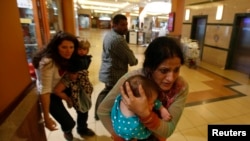One year ago Sunday (September 21, 2013), gunmen from Somalia's al-Shabab militant group stormed the Westgate shopping mall in the Kenyan capital, Nairobi, killing 67 people and scarring the nation. On this grim anniversary, survivors of the attack talked to VOA about how they have coped with the trauma of that day.
Victims describe experience
Harveen Sihra was on the rooftop of Westgate, taking part in a cooking competition hosted by a local radio station when two gunmen walked up a parking ramp, and opened fire.
At first she and those around her thought it was a robbery, but they were wrong.
“After a while I heard a lady she was like, 'Here, take my purse,' but then that man said, 'I don't want the purse, we are not robbers, we are from the al-Shabab,” Sihra said.
The gunmen told Sihra, a teenager, that they were taking revenge for Kenya's military operations in Somalia, and while they would not ordinarily shoot women and children, today they were making an exception.
“I did look at one of the men, eye-to-eye, and he shot me in my thigh. And I did feel a burning sensation but after, everything went blurred,” she recalled.
Sihra was shot two more times, in her stomach and her ankle. Her survival is extraordinary, but sadly, her grandmother and her cousin were killed in the attack.
Coping with trauma
While her wounds have healed, she said she still feels that loss. As a coping mechanism, she makes a deliberate effort to think about the events of Westgate -- the faces, the sounds -- every day.
“I did go to our preacher of the community and he did say that you should sit every day for 10 minutes and think, and I did try that and it does help because in that 10 minutes you think so much you get so exhausted from thinking, if you want to let out a tear you can, if you feel angry you feel it, because you're thinking so much. But then after that 10 minutes you feel really relieved,” she explained.
Sihra, like many Kenyans, is trying to come to grips with what happened on that dark day at the mall.
A parliamentary inquiry following the attack raised more questions than it answered, noting that the government had been warned that the mall was a target a year before it was hit. It also described a confused and poorly coordinated response from Kenyan security forces during the early hours of the attack that may have cost more lives.
Sihra's uncle, Ambi Ghataurhae, was also in the mall at the time. “We are waiting for answers about what happened, who are these people, how did they just walk into a shopping mall that our children used to go to every Saturday," he wondered, "That everyone in Nairobi used to go to?”
Less secure
Many Kenyans say they have felt less secure in the days since Westgate. Several grenade and gun attacks in Nairobi and near the coast, blamed on Somali militants, have amplified those fears.
Loi Awat, a television writer in Nairobi, hid for hours on the floor of a bank branch in the Nakumatt supermarket at Westgate as gunmen stalked the aisles, killing shoppers trapped in the store.
She said she has not focused on it that much in the past few months, but that the events of that day have clearly affected her.
“Nowadays, whenever I'm walking in town, I'm consciously alert. So I may not think directly about Westgate, but I feel like it stayed with me in a way that I'm constantly looking over my shoulder now,” said Awat.
For Awat, at least, it's not all negative. The experience of surviving a brush with death, she said has helped her to embrace life. “I feel like in the past year, I've done a lot. I've tried to produce a short film, I've tried to travel, doing things - I kept saying 'I want to do this, I want to do that' -- but in the past year, I did stuff. And I feel like it's been a good year for me honestly in terms of coping,” she explained.
Westgate Mall still stands today, despite massive destruction that took place inside as security forces battled militants over the course of several days. Construction workers move in and out of the building, which may one day reopen and, like so many other survivors, rise from the ashes of one of Kenya's darkest chapters.
Related video story by Mohammed Yusuf:








